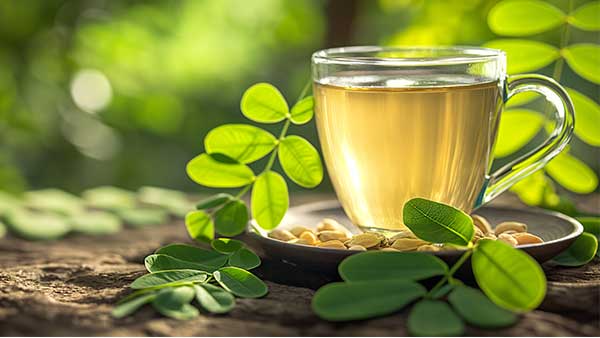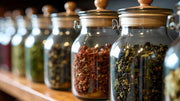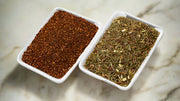From Leaf to Life: What Is Moringa Tea?

In the world of herbal teas, moringa tea is steadily gaining attention. This herbal tea has been celebrated for centuries in parts of Asia and Africa as both a daily tonic and a natural remedy.
Known as the "miracle tree," moringa is incredibly nutrient-dense, offering vitamins, minerals, antioxidants, and amino acids that make it stand out among herbal infusions. But what exactly is moringa tea, and why are so many wellness enthusiasts adding it to their daily routines? Let’s dive in.

What is Moringa Tea?
Moringa tea is a caffeine-free herbal infusion created from the dried leaves of the Moringa oleifera tree. This is a plant native to northern India but now grown throughout tropical and subtropical regions worldwide.
Unlike traditional teas that come from the Camellia sinensis plant (like green or black tea), moringa is considered an herbal tisane.
The leaves are harvested, washed, dried, and then either steeped whole or ground into a fine powder for tea preparation. Its flavor is often described as earthy, slightly grassy, and mildly bitter—similar to a mix between green tea and spinach but more subtle.
A Brief History of Moringa
Moringa has been used in traditional medicine for thousands of years. In ancient India, it was prized in Ayurvedic practices, where it was believed to help treat over 300 ailments. Beyond India, moringa spread across Asia, Africa, and eventually worldwide as its nutritional benefits became more widely recognized.
The tree itself is incredibly versatile. Nearly every part of the moringa tree—leaves, pods, seeds, bark, and roots—has been used for food, medicine, or even water purification. However, it’s the leaves that are most commonly consumed today in the form of tea or moringa powder.

What is Moringa Tea Made of?
One of the reasons moringa tea has earned its reputation as a "superfood" is its dense nutritional content. Moringa leaves contain:
- Vitamins: High amounts of vitamin C, vitamin A (beta-carotene), and vitamin E.
- Minerals: Calcium, potassium, magnesium, and iron.
- Protein: Unlike many plants, moringa contains all nine essential amino acids.
- Antioxidants: Compounds like quercetin and chlorogenic acid, which support overall wellness.
When brewed into tea, these nutrients are extracted into the water, giving drinkers a gentle, nutrient-rich beverage.
Potential Health Benefits of Moringa Tea
While research on moringa tea is still developing, early studies and traditional uses suggest it may offer a range of health benefits:
1. Rich in Antioxidants
Moringa tea contains antioxidants such as flavonoids, polyphenols, and ascorbic acid, which help combat oxidative stress in the body. Antioxidants are vital for protecting cells from damage and supporting long-term health.
2. May Support Healthy Inflammation Levels
Moringa’s bioactive compounds, including isothiocyanates, may help by reducing inflammation. This is especially valuable for supporting joint and immune health.
3. Supports Energy and Vitality
Because of its high vitamin and mineral content, moringa tea may help reduce fatigue and support energy levels naturally—without caffeine.
4. May Help Balance Blood Sugar
Some studies suggest that moringa leaf extracts may help stabilize blood sugar levels, though more human research is needed to confirm this benefit in tea form.
5. Promotes Digestive Wellness
Moringa has traditionally been used to support digestion and ease stomach discomfort. The tea’s mild bitterness can gently stimulate digestion, making it a good companion after meals.

What Does Moringa Tea Taste Like?
For those expecting a floral or fruity herbal tea, moringa may come as a surprise. Its flavor is best described as:
- Earthy and grassy (similar to green tea)
- Mildly bitter but not overwhelming
- Nutty undertones depending on how it’s processed
Some people enjoy it plain, while others add honey, lemon, or ginger to balance its flavor.
If the grassy flavor isn't your cup of tea, you can find it blended with strawberry tea for a sweeter result.
How to Brew Moringa Tea
Making moringa tea at home is simple:
- Measure: Use 1–2 teaspoons of dried moringa leaves (or one tea bag) per 8 oz cup.
- Boil: Heat fresh water to about 190–200°F (just below boiling).
- Steep: Pour water over the leaves and let steep for 5–7 minutes.
- Strain & Enjoy: Strain out the leaves and sip plain or with a natural sweetener.
For iced moringa tea, simply double the amount of leaves, brew hot, and then pour over ice.

When Is the Best Time to Drink Moringa Tea?
One of the great things about moringa tea is its flexibility—it’s caffeine-free, so you can enjoy it any time of day. That said, the best time depends on what you’d like to get out of it:
- Morning: Because moringa is rich in vitamins, minerals, and amino acids, many people like starting their day with a cup for a gentle, nutrient-packed boost without caffeine jitters.
- With Meals: Its mild bitterness can support digestion, making it a good companion to lunch or dinner.
- Afternoon: If you’re looking for a refreshing pick-me-up without the crash that coffee or energy drinks bring, moringa tea is a smart choice.
- Evening: Since it contains no caffeine, it’s safe to drink in the evening. Some even blend it with calming herbs like chamomile or lemongrass for a soothing bedtime brew.
In short, there’s no wrong time to sip moringa tea—morning and afternoon are the most popular, but it fits seamlessly into any part of your day.
Is Moringa Tea Right for You?
Moringa tea is generally considered safe for most people when consumed in moderation.
Note: Moringa tea is a natural, nutrient-rich herbal beverage, but it is not a substitute for medical advice, diagnosis, or treatment. While generally considered safe, some individuals—such as pregnant or breastfeeding women, or those with specific health conditions—should consult a healthcare professional before use.
As with any herbal supplement, side effects of moringa are possible, including mild digestive upset. Always enjoy in moderation and pay attention to how your body responds.
Conclusion
Moringa tea is much more than just another herbal beverage—it’s a nutrient-rich infusion with a history rooted in traditional medicine and wellness practices. From its earthy flavor to its impressive nutritional profile, moringa tea offers a caffeine-free way to support overall health.
Whether you’re looking for a daily wellness tonic, a natural source of antioxidants, or simply a new tea to enjoy, moringa tea is worth trying.






